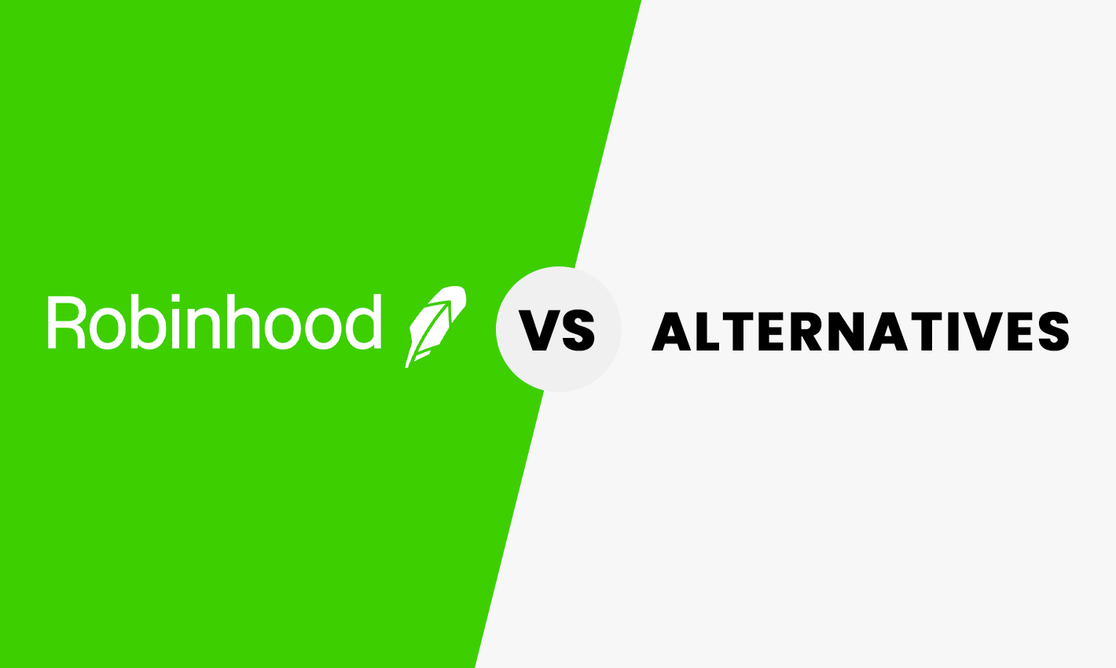- Frustrated that popular US share trading platform Robinhood is not available in Australia?
- There are alternatives to Robinhood that let you trade in US shares from these shores.
Robinhood is a hugely popular platform that lets people trade US stocks without commission. Users are drawn to its simple design and of course the lack of fees on share trades.
The problem for Australians hoping to use Robinhood is that it’s not available here. However, all is not lost!
There are a number of platforms available in Australia that let you trade US stocks without having to open a United States trading account.
Let’s take a look at some options.
Want to compare more investing platforms? Check out this comparison.

Our top pick
eToro
Trading platform most like Robinhood.
Based on what you can trade — not just US shares, but also ETFs and crypto— we think the closest alternative to Robinhood in Australia is eToro.
eToro also offers fractional trading, which means you can buy part of a share — useful for investing in more expensive companies such as Amazon and Tesla. You calso invest in other assets including crypto.
At present, eToro offers 1,257 US stocks (766 on the NYSE and 491 on NASDAQ), which is less than other platforms such as Stake and SelfWealth. However, each available stock is listed on the site, a handy option if you want to browse.
eToro markets itself as a social trading platform, which means users can discuss their trades and work together to invest in shares they believe will pay off. For example, when you call up a share on the app, it will give you a list of recent comments from fellow traders. It also offers social-trading, which means you can directly copy the trades of other investors.
eToro has a five-tier loyalty program which ranges from Silver to Diamond, providing various benefits according to realised equity. The minimum deposit on eToro is USD $50.
Pros
- Fractional trading means you can buy a part of a share.
- User-friendly interface that lists each stock available to trade. Great if you want to browse stocks.
- Social trading and copy trading. These features allow you to compare notes with other traders and also directly copy others’ trades, either in full or in part.
Cons
- Minimum deposit is USD $50. This could be an issue if you were hoping to start smaller.
- Currency conversion fee. eToro will charge a fee to convert your AUD into USD so you can trade in US stocks. The fee will depend on the size of the conversion.
- Withdrawal fee. If you withdraw money from your eToro account you will be charged USD $5, with the minimum withdrawal set at USD $30.

Runner-up
Stake
Great alternative if only interested in US shares.
Australian platform Stake has a very focused approach. It only offers US stocks, but there are plenty of them available. Stake’s website homepage boasts you can choose from more than 3,800 stocks, and trade commission-free. It also offers fractional investing in shares.
Stake has a stripped-back interface and to find stocks you have to search for them by code. However, it also features lists of trending stocks in key sectors.
The minimum deposit is USD $50 and when you fund your account you receive a free stock in Nike, DropBox or GoPro. (In our experience, you're most likely — by far — to get GoPro.)
Stake also offers a premium product, Stake Black. For USD $9 month billed monthly, or USD $90 per year (USD $7.50/ month), Stake Black gives users access to analyst ratings, price targets and full company financials as well as instant trades - you don’t have to wait for the proceeds of a sale to clear after execution, a process that normally takes two days, before you can reinvest.
If you want instant trades without buying the premium service, you will be charged 0.5 per cent.
Pros
- Allows you to trade in US stocks without opening a US trading account. Very handy for those in Australia wanting to trade in US shares.
- Low minimum deposit of $50. Those starting off in share trading can start small.
- Free stock. When you deposit funds into your new account you receive a share in Nike, DropBox or GoPro.
- US tax compliance taken care of. When you sign up, Stake will electronically sort out the form for US tax compliance — the W-8BEN form — for a fee of USD$5.
Cons
- Basic interface. The Stake layout is not as sophisticated as other platforms and data only goes back three years.
- Currency conversion fee. Stake charges you 0.7 per cent each time you transfer funds from AUD to USD and vice versa.
- Bank processing fee. There is a fee of USD $2 each time you withdraw money from your account, with a minimum fee of USD $10.

Honourable mention
SelfWealth
Trade markets in the US and Australia, for a low fee.
SelfWealth is another Australian-based platform that allows you to trade US stocks, as well as Australian shares and ETFs. However, it's not free. SelfWealth charges a flat fee of USD $9.50 for all trades on US markets and AUD $9.50 for local trades.
You will have to set up an account to trade Australian shares before you can establish one to trade US shares and you can only fund your US account from your Australian account.
SelfWealth will charge you a 0.6 per cent fee when you move money between your accounts.
Setting up an account gives you free 90-day access to its Premium service, which offers features including an impressive array of share analysis information, detailed stock reports and, like eToro, a social trading aspect.
SelfWealth says being part of its community will let you follow other investors so you can see their portfolio, the trades they are making and the returns they’re achieving. All information is anonymous.
After the free access expires, you will have to pay $20 a month for Premium access.
The minimum deposit is AUD $500, to take into account the minimum order size for a first order of shares on the ASX.
Pros
- Allows you to trade in US stocks, as well as Australian stocks. Handy for those who want to trade in both countries using the same platform.
- Free US tax compliance. SelfWealth will sort out the US tax compliance form, known as a W-8BEN, for you.
- Handy learning centre. This features videos covering a range of subjects related to stock market investing.
Cons
- Not commission-free. There is a USD $9.50 charge on all US trades and a A $9.50 charge on all Australian trades.
- Two-step process to trade US stocks. You need to first set up an account to trade Australian shares before you can establish an account to trade US stocks.
- Minimum deposit of AUD $500. This is so you can trade in Australian stocks, but not the cheapest option around.
- Takes up to three days to set up your account. This could be a drawback for those keen to start trading straight away.
- Currency conversion fee. SelfWealth charges 0.6 per cent each time you transfer money between AUD and USD and vice versa.

CMC Markets
Good for more experienced traders.
We are now starting to move into more complex territory. CMC Markets was started in the UK in 1989 by Peter Cruddas, a Londoner who left school decades earlier at 15 with no qualifications.
His firm concentrates on CFD’s and spread betting however, they do also offer commission-free trading in US, UK, Canadian and Japanese stocks.
CMC charges a commission for trading Australian shares, which depends on the number of trades you make each month (AUD $11 per trade if you make less than 11 trades per month and AUD $9.50 per trade if you make 11 or more trades per month).
The minimum trade for all international shares with CMC markets is AUD $1,000, so this not the platform for you if you just want to start small.
As well as a foreign exchange fee of 0.6 per cent, CMC adds a 2 per cent forex 'buffer' to cover overnight fluctuations in currencies while the trade is being made. If the buffer level isn't reached, you won't pay that amount.
Pros
- Commission-free trading on US stocks. Offers another option for those looking to trade in US markets.
- Slick, full-colour trading interface. The overview information, charts and graphs are informative and easy on the eye.
- Morningstar research reports on stocks. Detailed information from the reputed analyst company that can help broaden your knowledge of companies you are interested in.
Cons
- Minimum trade is AUD $1,000. Could be a hurdle for those starting in, or looking to dabble in, US share trading.
- Foreign exchange fee. If you make a trade in international shares, you will be charged 0.6 per cent.
- Forex buffer. CMC factors in another 2 per cent to cover overnight currency fluctuations on ‘buy’ orders.

IG Markets
For more advanced traders with broader market access.
Another British firm, IG Markets started in 1975 so it is about as legit as they get. While it is best known for CFD trading, you can trade in the US, UK, German and Irish stock markets commission — free like Robinhood. Furthermore, you can trade Australian shares at a commission of $5 if you make at least three trades in a month, or $8 if you make less trades than that. IG charges a 0.7 per cent for international currency transfer.
They also charge a quarterly subscription fee of $50. However, this is waived if you trade at least three times on your share trading account during the quarter or hold no open positions in your share trading account at the end of the quarter.
Setting up an account is quick and straightforward and you can fund your account through credit/debit card, bank account or Paypal.
The minimum deposit is A$450. The platform is clearly laid out and easy to navigate and also offers an excellent education section with videos.
Pros
- Trade US, UK, German and Irish stocks commission-free. Not having to pay commission to trade overseas stocks is a big attraction.
- Easy-to-navigate interface. It’s very easy to get around the platform and find the information you need.
Cons
- Minimum deposit of AUD $450. Again,may be a stretch for those looking to start small.
- $50 quarterly subscription fee. IG Markets will charge you the fee unless you meet certain conditions.
- Forex fee. You will be charged 0.7 per cent for transferring funds between currencies.

